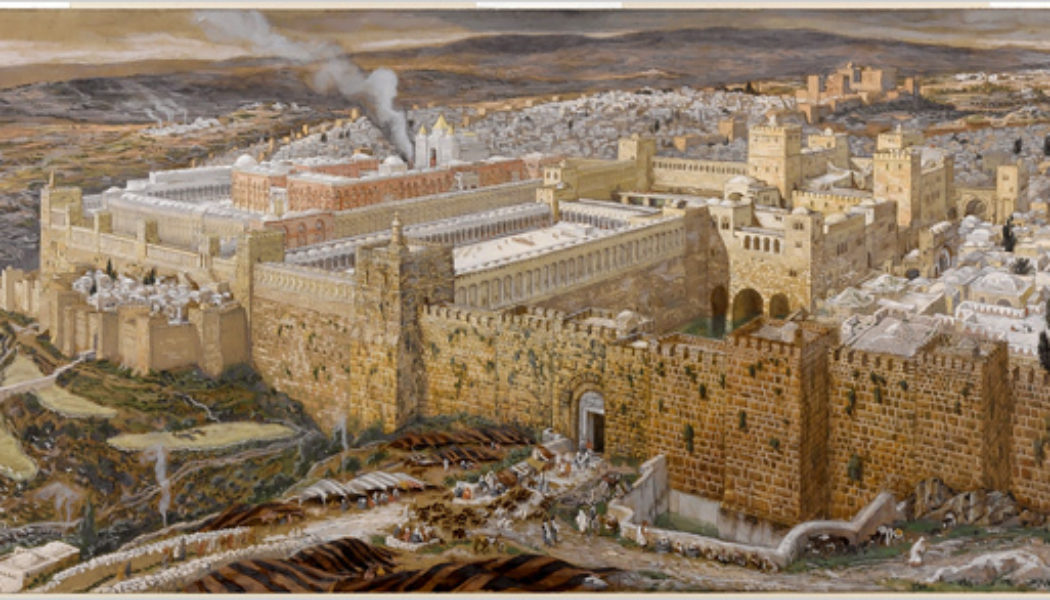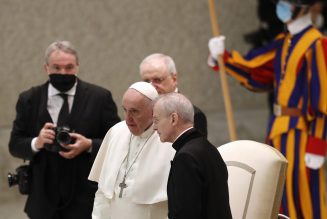
As winter approaches and the end of the liturgical year draws near, we ponder the passing quality of this world and the fading of its glories. Jesus’ words in today’s Gospel reading must surely have shocked, even horrified, His apostles. Let’s look at His stunning words and seek to apply them in our own life.
In today’s Gospel, Jesus is at the top of the Mount of Olives with His apostles. From this vantage point, they look across the Kidron Valley to the magnificent Temple and all of Jerusalem spread out before them. The apostles marvel at the glorious beauty of the Temple. Its large, perfectly-carved, white, gilded, ashlar stones gleam like the sun. Indeed, it was one of the wonders of the ancient world, so beautiful and majestic.
Jesus challenges their admiration. He shocks them with the admonition that all the glory they see is soon to be destroyed, that not one stone will be left on another, that it will all be thrown down (Mk 13:2). Shocked, the apostles ask Him when this will happen and what signs will precede this awful event.
Jesus teaches them that all the glory they see is about to be taken away. The Temple, with all its rituals, its liturgical cycles, and its endless slaughter of animals in sacrifice for sin, is about to be replaced. These ancient rituals merely pointed to Jesus and all that He would do. Jesus is now the Temple; He is also the Lamb Sacrifice. All that the Temple pointed to is fulfilled in Jesus. Thus, the Temple is at an end. Jesus is ushering in a New Covenant. Sure enough, 40 years later (in A.D. 70), the Roman Army, after having surrounded Jerusalem for a period of 3 ½ months, breached the walls, poured into the city, and destroyed the Temple and all of Jerusalem. In this epic battle, according to Josephus, 1.2 million Jewish people lost their lives. As Jesus prophesied, not one stone was left on another. According to Josephus, so complete was the destruction of Jerusalem, that when the Romans had finished their work it was not clear that the city had ever existed.
In 2000 years, despite several attempts, the Jewish Temple has never been rebuilt. Everything Jesus predicted came to pass. This is the historical place and context of today’s Gospel.
What does this mean for us, some 2000 years later? Let’s consider three basic themes.
1. The Perspective of Passing – Toward the end of the Gospel passage, the Lord says, Heaven and earth will pass away, but my words will not pass away. Note the definitiveness of this statement: this world will pass away. All of the things that impress us: the might of the powerful, the influence of the popular, the glory of all the glitterati—all of this will pass away.
Indeed, even now it is passing away, its destruction is at hand. Scripture says,
-
-
-
- The world in its present form is passing away (1 Cor 7:31).
- We have here, no lasting city (Heb 13:14).
- Put not your trust in princes, in mortal men in whom there is no hope. Take their breath, they return to clay, and their plans that day come to nothing (Psalm 146:3-4).
-
-
Yes, all of the glory, even what seems beautiful and fair, is passing away. Don’t be so impressed by this world’s offerings. All of it—no matter how powerful, influential, or sturdy it may seem—is slated for destruction. It is already passing away.
Painful though this perspective may be, it is important and healing. It brings with it a string kind of serenity. Like every truth, the truth that all things are passing sets us free. We are reminded not to set down too many roots here so that we are not resentful when this world passes away.
2. The Permanence Proclaimed – The Lord tells us that His words will not pass away. Although the world will pass away, the truth and the Word of God will remain forever.
Too many people root their lives in passing things. The challenge for us is to root our lives in the Word of God, which remains forever. Worldly glories, power, access, and wealth—all these things fade and disappear, but God’s wisdom and His plan remain forever.
Consider, for a moment, the Church. The Lord has said that the forces of Hell would strive to prevail, overpower, and destroy the Church, but He promised that such attempts would never be successful (Matt 16:18). The Church is indefectible, by God’s Word, by His promise. No weapons, no war waged against the Church, will prevail.
In all of this the Lord has been proven correct. The Church has seen the Roman Empire, the Carolingian Empire, the British Empire, the Soviet Socialist Republic, and many others rise to power only to fade and disappear. Heresies and all sorts of foolishness have come and gone, and here we still are proclaiming the eternal Gospel, the Word of the Lord. Though the world will pass away, the Word of the Lord will remain forever!
3. The Priority Prescribed – If this world as we know it is passing away, and the Lord, His Kingdom, His Church, and His Word will remain forever, what should be our priority? The Lord says, in effect, that we know very well what our priority should be, but we willfully ignore it.
Learn a lesson from the fig tree. When its branch becomes tender and sprouts leaves, you know that summer is near. In the same way, when you see these things happening, know that he is near, at the gates (Matt 24:32-33).
Yes, we know very well that the Day of Judgment is coming. Too easily, though, we dream on and do not follow the prescribed priority. Wealth, fame, and glory are all uncertain and passing, but death, judgment, Heaven, and Hell are certain and remain forever. We too easy fiddle on with things that are uncertain and passing while neglecting what is certain and eternal. Ridiculous!
It would be foolish to book passage on a sinking ship. Similarly, it is imprudent to make this world and its demands our fundamental priority. It is wise to set our sights on, and lay hold of, the Kingdom that lasts forever. It is sad that so many spend people their time “rearranging the deck chairs on the Titanic” of this world.
What are our priorities? Frankly, most of our priorities are not things that matter to God. Even if we attain the passing things for which we strive, they will all ultimately slip through our fingers. We obsess over passing things like our physical health while neglecting enduring things like our spiritual health. We should care for our bodies, but even more should we care for our souls. If we would expend as much effort looking for a time and place to pray as we do searching for a restaurant for dinner, we would be spiritual heavyweights rather than physically overweight.
In today’s Gospel the Lord stands before the Temple: an impressive building, a symbol of power and of worldly glories. Impressed by it though the Apostles are, the Lord is not impressed with passing things. He counsels us to get our priorities straight and to focus on things that last: His Word, which never passes away, and our ultimate destiny, where we will spend eternity.
We find time for everything else, why not for prayer, Scripture, fellowship in the Church, and the sacraments?
What are your priorities? Be honest, now, be honest.
[embedded content]
[embedded content]
Join Our Telegram Group : Salvation & Prosperity









